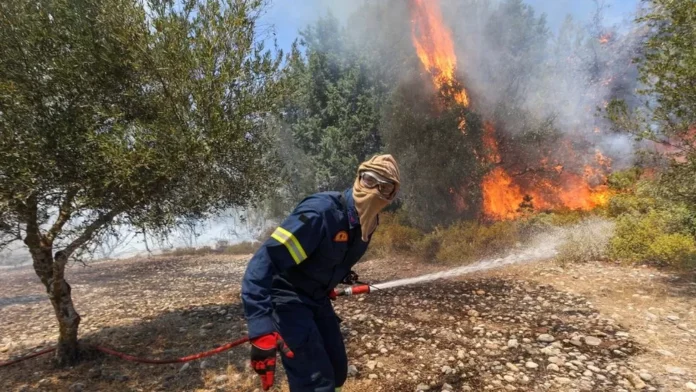Tragic Mediterranean Wildfires Claim Over 40 Lives
In the scorching summer of 2023, the Mediterranean region witnessed a devastating outbreak of wildfires that wreaked havoc in Algeria, Italy, and Greece. More than 40 lives were lost, villages and holiday resorts were threatened, and thousands of people had to be evacuated from their homes. The ferocity of the flames, exacerbated by long-lasting heatwaves, presented an unprecedented challenge to firefighters, and the repercussions were felt across the affected nations.
Algeria’s Grim Toll
Algeria was one of the hardest-hit countries, with a heavy death toll of 34 people. Among the victims were ten soldiers who found themselves surrounded by flames during an evacuation in the coastal province of Bejaia, east of Algiers. The region of Bejaia bore the brunt of the disaster, accounting for 23 of the fatalities, as reported by local media. Despite authorities’ efforts to contain the blazes, the fires persisted, necessitating a massive firefighting endeavor involving about 8,000 personnel, hundreds of fire engines, and some aircraft.
As of the most recent update, approximately 80% of the blazes have been extinguished since Sunday, but the battle against the inferno is far from over. Algeria continues its relentless firefighting operations to ensure the safety of its citizens and communities.
Greece’s Ongoing Crisis
Greece, too, faced the wrath of the wildfires, prompting the evacuation of thousands of residents and tourists alike. The island of Rhodes witnessed a flurry of evacuation flights as fires continued to rage. On other Greek islands like Corfu and Evia, people had to flee to safer grounds to escape the advancing flames.
The situation remains dire as a long heatwave shows no sign of abating. Meteorological experts have forecasted temperatures soaring above 44°C (111°F) in certain parts of Greece, exacerbating the already challenging firefighting conditions. The Civil Protection Ministry of Greece has issued a warning of “extreme danger” in six out of the country’s 13 regions, heightening the urgency of the crisis.
Italy’s Duality of Disasters
Italy, a country known for its stunning landscapes and picturesque vistas, experienced a contrasting duality of extreme weather events during this tragic period. While the northern regions battled deadly storms, the southern regions, including Sicily, endured destructive wildfires.
In Sicily, a couple in their 70s tragically lost their lives in a fire that engulfed their holiday home near Palermo. The city of Catania faced a crippling water and power outage as high temperatures, reaching a scorching 47.6°C on Monday, took their toll on infrastructure.
On the mainland, in Calabria, just east of Sicily, a harrowing incident saw a 98-year-old man trapped in his home by encroaching flames. In an attempt to save him, his daughter and son-in-law sustained burns.
As the wildfires encroached on the Foggia region, located on Italy’s Adriatic coast, approximately 2,000 individuals had to be evacuated from hotels and campsites. The blaze threatened the charming town of Vieste, placing it at risk of destruction.
The Impact of Climate Change
The severity and intensity of these heatwaves and wildfires have left many questioning the role of climate change in exacerbating natural disasters. A team of climate scientists known as the World Weather Attribution group has drawn a direct link between human-induced climate change and the intensity of this year’s heatwave in Southern Europe, North America, and China.
As temperatures continue to soar and extreme weather events become more frequent, the urgency to address climate change and its ramifications has never been more apparent. Collaborative efforts on a global scale are imperative to curb the progression of climate change and protect vulnerable communities from the devastating consequences of wildfires and other natural disasters.
Tourism’s Fragile Balance
Beyond the immediate impact on lives and property, these wildfires also pose a significant threat to the tourism industry in the affected countries. In Greece, tourism is a lifeline for the economy, accounting for one in five jobs, and islands like Rhodes heavily rely on tourist footfalls. However, with the ongoing crisis and the threat of wildfires, tourism has taken a hit, with holiday firms like Jet2 and Tui canceling departures for Rhodes in the coming days.
While the UK Foreign Office has not issued advisories against travel to the affected regions in Greece, tourists are urged to stay informed and updated through their tour operators. The situation underscores the delicate balance between maintaining a vibrant tourism industry and safeguarding the well-being of both visitors and locals.
A Plea for Support
In the face of these calamities, nations like Italy have sought international support to bolster their firefighting capabilities. Italy’s Civil Protection minister, Nello Musumeci, has announced his intention to appeal to the European Union for additional Canadair firefighting planes to strengthen their firefighting fleet. Such support and cooperation are crucial in responding effectively to natural disasters of this magnitude.
Conclusion
As the fires continue to rage and the brave firefighters battle against all odds, our hearts go out to the affected communities in Algeria, Italy, and Greece. The devastation caused by these wildfires serves as a somber reminder of the urgent need to address climate change and invest in disaster preparedness. The collective efforts of nations, communities, and individuals are essential to building resilience against the increasing threats posed by extreme weather events and natural disasters.
Let us stand together in solidarity, supporting those impacted by these wildfires, and work towards a future where such tragedies can be mitigated through global cooperation and a shared commitment to protecting our planet and its inhabitants.








[…] Tragic Mediterranean Wildfires Claim Over 40 Lives […]
[…] Tragic Mediterranean Wildfires Claim Over 40 Lives […]